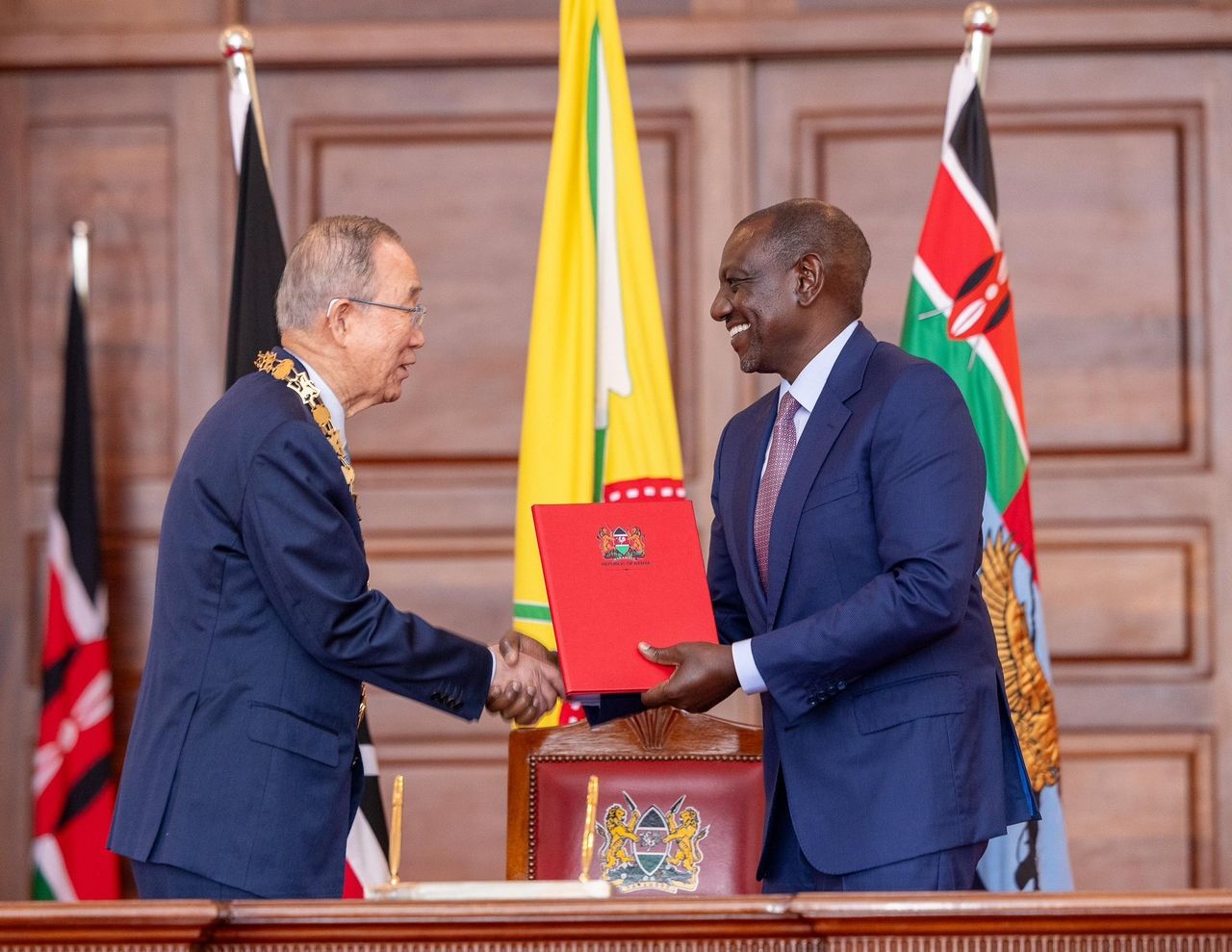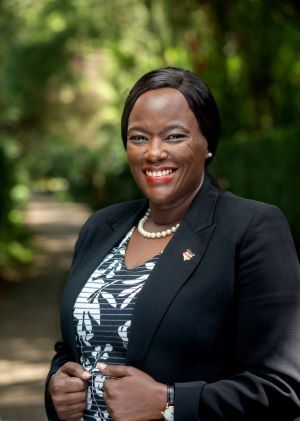 On July 8, 2025, Kenya bestowed its highest civilian honor, the Chief of the Order of the Golden Heart, upon Ban Ki-moon, the 8th United Nations Secretary-General, during a landmark ceremony at the State House in Nairobi.
On July 8, 2025, Kenya bestowed its highest civilian honor, the Chief of the Order of the Golden Heart, upon Ban Ki-moon, the 8th United Nations Secretary-General, during a landmark ceremony at the State House in Nairobi.
This event underscored Kenya’s pivotal role in championing sustainability while highlighting Ban’s enduring impact on advancing climate action. The award, presented in Nairobi, recognized not only his extensive diplomatic achievements but also his unwavering commitment to fostering multilateral cooperation in addressing climate change.
During his tenure at the United Nations, Ban was instrumental in forging groundbreaking agreements, most notably the Paris Climate Accord.
His tireless efforts to unite nations in the pursuit of a greener, more equitable world have made a lasting impact on global policy and have inspired a new generation of leaders.
Kenya’s decision to honor Ban’s contributions stands as a testament to the country’s environmental leadership, reinforcing its status as a beacon of hope and innovation throughout the African continent.
In his tribute, President William Ruto hailed Ban as “a bridge-builder and champion of the world’s most vulnerable,” praising his “relentless advocacy and steadfast dedication to creating a peaceful, just, and sustainable world.” Ruto emphasized that Ban’s tenure as the eighth UN Secretary-General was marked by significant and transformative initiatives.
Ban’s leadership played a crucial role in the adoption of the Paris Agreement on climate change, the establishment of UN Women to promote gender equality, and the introduction of the Sustainable Development Goals, all aimed at addressing some of the world’s most pressing challenges.
During his acceptance speech, Ban expressed heartfelt gratitude, stating, “I am truly humbled to receive such recognition in this beautiful country. Kenya holds a special place in my heart, both professionally and personally.” He mentioned that his daughter met her husband in Kenya and that his grandson spent his early years in Nairobi. This personal connection deeply resonates with Kenya, a nation that has welcomed Ban Ki-moon in both private and official capacities over the years.
The award ceremony coincided with the groundbreaking of the dual headquarters for the Global Centre on Adaptation at the Kenya School of Government in Nairobi. Currently based in Rotterdam, Netherlands, in the world’s largest floating office, the GCA is dedicated to accelerating climate adaptation solutions. Its new African base will serve as a regional hub for policy dialogue, research, and capacity building.
The establishment of dual headquarters symbolizes a bridge between the Global North and South in confronting climate challenges.
The GCA’s presence in Nairobi reaffirms Kenya’s leadership in climate resilience and sustainable development.
Ban’s post-UN leadership remains deeply anchored in climate resilience and sustainable development. As President and Chair of the Global Green Growth Institute and co-founder of the GCA, he continues to champion climate adaptation and green growth, especially in vulnerable regions such as Africa.
Kenya’s association with these two organizations is no coincidence; it reflects a shared vision that climate action must be inclusive, locally led, and globally supported. Ban’s award ceremony in Nairobi—home to the only UN headquarters in the Global South, which includes the UN Environment Programme and the UN Office at Nairobi—symbolizes the multilateral diplomacy that defined his career. Notably, President William Ruto, who presented the award, is a leading voice in global climate leadership as chair of the Committee of African Heads of State and Government on Climate Change. Kenya’s decision to honor Ban is both a symbolic gesture and a strategic affirmation of the country’s commitment to environmental diplomacy.
During the ceremony, Ban remarked on the urgency and hope that characterize the climate movement: “Climate change is the greatest collective challenge we face as a human family. But it is also our greatest opportunity for common progress toward a sustainable future.” He added, “The longer we delay, the more we will pay.”
These words strike a deep chord in Kenya, where communities are already contending with the impacts of droughts, floods, and biodiversity loss. Yet, through innovation, policy reform, and international cooperation, Kenya is charting a path that prioritizes people, the planet, and prosperity.
The conferment of the Chief of the Order of the Golden Heart upon Ban is more than a ceremonial gesture. It is a declaration of Kenya’s core values: solidarity, sustainability, and global citizenship. It honors a legacy of leadership that has helped shape the world and signals Kenya’s readiness to lead the next phase of international climate action.
As Ban eloquently stated, “This century is Africa’s century, and Kenya is not just a leader in Africa; it is a global example of how nations can rise to meet the challenges of our time with courage, innovation, and unity.”
In celebrating Ban, Kenya also celebrates the power of diplomacy, the promise of green growth, and the potential of a continent poised to shape the future.
 Emmy Kipsoi is the Kenyan Ambassador to South Korea. The views expressed in this article are her own. –Ed.
Emmy Kipsoi is the Kenyan Ambassador to South Korea. The views expressed in this article are her own. –Ed.










Most Commented